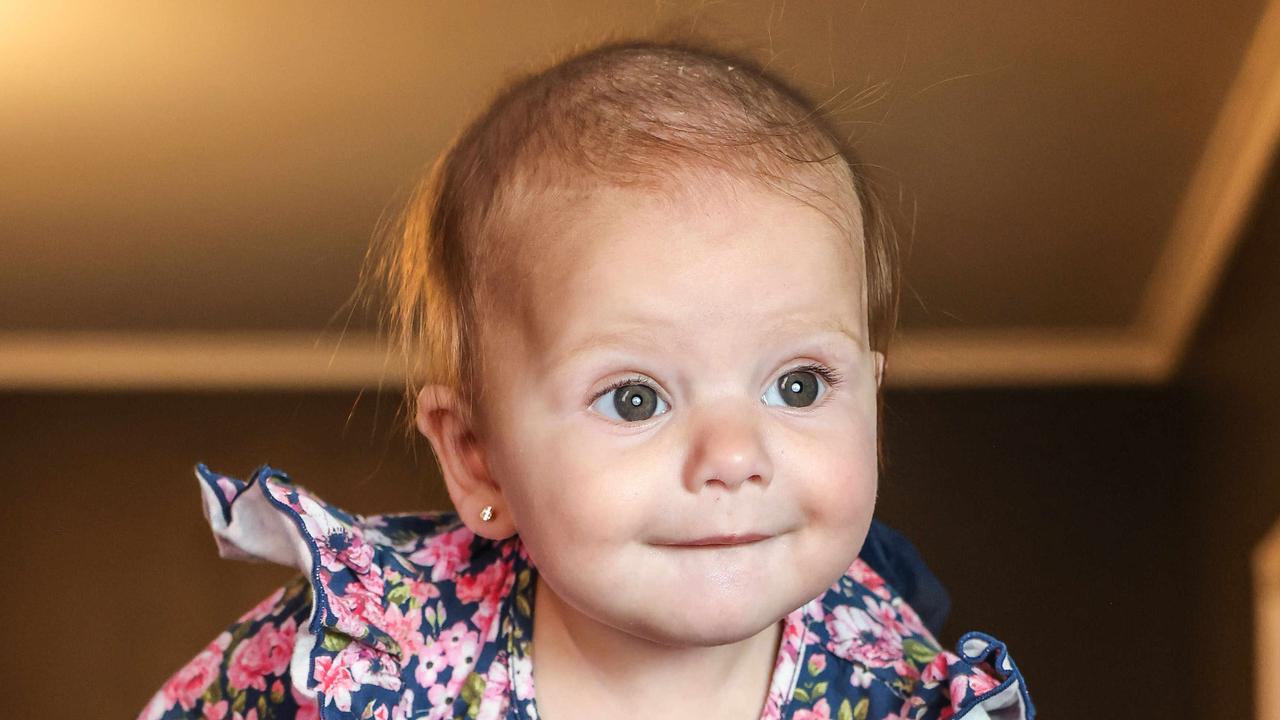New paediatric service provides best of care for children
A free Child and Adolescent Virtual Urgent Care Service is looking after our youngest South Australians.

SA News
Don't miss out on the headlines from SA News. Followed categories will be added to My News.
When 18-month-old Charlotte hurt herself playing at about 7pm on a Sunday night, her mum Julie Power was unsure what to do to make it better.
As Charlotte sadly cradled her pulled elbow, Power pondered whether an X-ray was required or if it could wait until the following day to be treated.
She logged on to the Women’s and Children’s Hospital’s free Child and Adolescent Virtual Urgent Care Service (CAVUCS) to get advice.
“I thought the only place where X-ray imaging may be available at that time of the week was going to be at the hospital, but didn’t know whether or not it was going to be a long wait in the emergency department,” she says.
“I thought CAVUCS would be good to just ring for some advice, knowing they wouldn’t tell us to come in if it was something that they could avoid.”
CAVUCS is a unique paediatric service staffed by paediatric emergency nurses, doctors and other clinicians.
Launched in August 2021, it connects parents with a virtual team of highly skilled emergency staff who can assess and provide medical advice for children aged between 6 months and up to 18 years.
To access it, caregivers click on the CAVUCS website link on their smartphone, tablet or computer and complete an online form, answering questions for triage just as they would if attending an emergency department in person.
If this information reveals an Emergency Department visit or ambulance call is required, they are advised to do so. Those who can continue virtually begin a telehealth video call, where a nurse and/or doctor can view the patient and may guide caregivers in reporting observations such as heart or respiratory rates, providing images or even treating medical issues.
Since inception, a trip to the emergency room has then been advised for only 10 per cent of patients.
Ninety per cent have avoided the ED by being discharged to other providers such as SA Health Priority Care Centres or their primary healthcare providers.
Dr Benjamin D’Souza, CAVUCS medical unit head and a paediatric emergency physician, says its goal is to “make sure that we see the right patient at the right time, in the right place for the right person”. “We know that a large percentage of paediatric presentations to our Emergency Department are of low acuity,” Dr D’Souza says.
“Parents have a heightened concern for their children – they want the best care fast, which is why they tend to come to Emergency Departments much more than they would for an adult.
“They don’t really need to come into the hospital for smaller issues but parents don’t always know what’s small and what’s not, so we are happy for them to navigate the health system this way.”
Power was initially coached to try to fix her daughter’s injury but, when she could not, she was advised to bring Charlotte in for treatment.
“We didn’t have to wait in the ED for hours and hours and hours,” she says.
“It was very reassuring – I could take a breath because I knew that it was all going to be OK, especially when you’ve got someone there who’s calm and can understand and talk you through it on the video chat, and can actually see the child as well.”
The service can be accessed anywhere in South Australia seven days a week between 9am and 9pm. The Emergency Mental Health Service is also available via phone from 1.30pm to 8.30pm, 7 days a week.
Register for the Virtual Urgent Care Service at wch.sa.gov.au/patients-visitors/emergencies/virtual-urgent-care
Outreach program hits Island roads for those in need

An innovative community health outreach program is making a world of difference to Kangaroo Island residents such as Arthur McKenzie.
The 87-year-old former insurance salesman – who retired from city life to his Emu Bay property “to go fishing” more than 25 years ago – says the home visit scheme has been invaluable in allowing him to maintain his independence.
In particular, he says the ongoing care from nurse practitioner Hamish Anderson and his colleagues following a recent part-finger amputation – a complication of diabetes – has been critically important.
The healthcare workers visit once a week in a repurposed ambulance to change his bandages, run other health checks and offer advice – keeping him out of the Kangaroo Island Medical Clinic in Kingscote and in his own home as a result.
“As you get older the confidence that you can get from somebody you know is very valuable because you know just who you can talk to and trust,” McKenzie says. “If it wasn’t for this Outreach program, I might not have been able to stay at home.”
The KI Outreach Program is run under the umbrella of the Country Health Connect Referral Service, which offers a wide range of in-home and community-based services to older people, people living with disability, children and carers across regional South Australia.
Anderson, who also works in the Flinders Medical Centre and Noarlunga Hospital Emergency Departments, says the pilot program aims to improve access to healthcare for people who “for one reason or another” can’t easily see a GP.
“So we’re trying to increase access for the people who normally wouldn’t actually be able to get in and see the doctor and improve the healthcare for people who live in remote areas,” he says.
Covering the length and width of the island, Anderson estimates the Outreach carers – which also includes other nurses, a diabetes educator and Aboriginal health workers – would have made more than 320 home visits since the program started. Day clinics are also held once a week in Parndana and Penneshaw.
“We’re generally looking at the chronic disease end of things – people with airway issues or heart failure or diabetes,” Anderson says of the typical patients.
“All those things that are going to be lifelong management-type issues. Our aims is to help people manage those conditions without them getting worse so they don’t end up in hospital or in emergency departments.”
While not technically a “first responder”, Anderson’s background in emergency departments means he well qualified to act or provide advice on immediate concerns.
“I might have someone who might say ‘oh, I’ve got these tingling feet, what’s going on with me?’ I can do an exam there and then say ‘right, call an ambulance’ ... or ‘you can wait and see your GP next week’. So a lot of times it actually is just a matter of easing people’s minds.
“Sometimes people just need that connection or that reassurance that someone’s there for them.
“If things are out of whack, I’ll certainly get them into the doctors to get the ball rolling, but then we can maintain it from then on.”
Anderson expects the KI service to become busier as more residents become aware of it – and is also keen to see it replicated elsewhere throughout SA and the rest of Australia.
“I feel like it’s been well-received so far, but it’s a matter of building momentum to actually get to everyone that needs to be seen,” he says
“I think if we get it right here it could potentially be transplanted around Australia as a different way of dealing with health.”
McKenzie is also hoping to see the program become a long-term fixture on KI’s healthcare landscape.
“The clinic and hospital are doing their best but they are overloaded,” he says. “So I hope that the Outreach program can be a permanent thing.”
Country Health Connect offers a wide range of in-home and community-based services to older people, people living with disability, children and carers across regional South Australia. Anyone of any age or ability may be eligible to access its services.
For details: countryhealthconnect.sa.gov.au
Originally published as New paediatric service provides best of care for children


